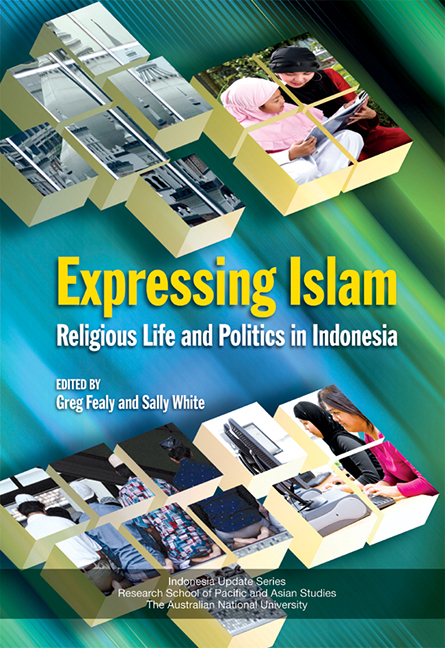Book contents
- Frontmatter
- Contents
- List of Figures and Tables
- List of Contributors
- Acknowledgments
- Glossary
- Map
- 1 Introduction
- PART I EXPRESSING PERSONAL PIETY
- PART II POLITICAL, SOCIAL AND LEGAL EXPRESSIONS OF ISLAM
- 7 Religion, Politics and Social Dynamics in Java: Historical and Contemporary Rhymes
- 8 Islam and Gender in Contemporary Indonesia: Public Discourses on Duties, Rights and Morality
- 9 Online Fatwa in Indonesia: From Fatwa Shopping to Googling a Kiai
- 10 Regional Sharia Regulations in Indonesia: Anomaly or Symptom?
- 11 ‘As Long as It's Halal’: Islamic Preman in Jakarta
- 12 Indonesian Terrorism: From Jihad to Dakwah?
- PART III THE ISLAMIC ECONOMY
- Index
- Indonesia Update Series
- Plate section
9 - Online Fatwa in Indonesia: From Fatwa Shopping to Googling a Kiai
from PART II - POLITICAL, SOCIAL AND LEGAL EXPRESSIONS OF ISLAM
Published online by Cambridge University Press: 21 October 2015
- Frontmatter
- Contents
- List of Figures and Tables
- List of Contributors
- Acknowledgments
- Glossary
- Map
- 1 Introduction
- PART I EXPRESSING PERSONAL PIETY
- PART II POLITICAL, SOCIAL AND LEGAL EXPRESSIONS OF ISLAM
- 7 Religion, Politics and Social Dynamics in Java: Historical and Contemporary Rhymes
- 8 Islam and Gender in Contemporary Indonesia: Public Discourses on Duties, Rights and Morality
- 9 Online Fatwa in Indonesia: From Fatwa Shopping to Googling a Kiai
- 10 Regional Sharia Regulations in Indonesia: Anomaly or Symptom?
- 11 ‘As Long as It's Halal’: Islamic Preman in Jakarta
- 12 Indonesian Terrorism: From Jihad to Dakwah?
- PART III THE ISLAMIC ECONOMY
- Index
- Indonesia Update Series
- Plate section
Summary
In Indonesia, although individual Islamic scholars still issue fatwa, these are increasingly the province of the three major Islamic organisations: Muhammadiyah, Nahdlatul Ulama (NU) and the Indonesian Council of Ulama (MUI). Through their fatwa, these three organisations have responded to the problems of Indonesian Muslims for over 70 years (Hooker 2003; Hosen 2003). A fatwa is a ruling on a point of Islamic law or dogma issued by an authorised religious scholar, that is, an ulama, kiai, imam, mufti or mujtahid, based on a question asked by an individual inquirer (mustafti), a judge (qadi) or a government authority or corporate entity. The fatwa issued in response to a question is often published or disseminated in some form to the wider Islamic community. In this way, a fatwa given to an individual questioner can be used to educate and inform a wider audience. However, as will be discussed below, Muham-madiyah, NU and MUI have been struggling to disseminate their fatwa to the mass of Indonesians. It is in this context that the internet offers a new tool for Islamic organisations to bring their ideas and opinions before a global audience.
At present, Muhammadiyah, NU and MUI continue to disseminate their fatwa through traditional paper-based distribution methods. In the case of NU, for example, all fatwa issued between 1926 and 1940, and many of those issued between 1940 and 1994, have been compiled in two volumes edited by K.H. Azis Masyhuri (1997) under the title Masalah Keagamaan Hasil Muktamar dan Munas Ulama Nahdlatul Ulama 1926–1994 [Rulings of the Legal Experts Based on the Congresses of NU]. Unfortunately, the distribution of these books is not widespread and it is difficult to find them even in the larger bookshops (Hosen 2004b).
Muhammadiyah's fatwa are published in Himpunan Putusan Tarjih [Compilation of Tarjih Decisions] (Muhammadiyah n.d.). This official volume is circulated and distributed at every major meeting of the organisation and at its Islamic schools. Every teacher, lecturer and preacher of Muhammadiyah uses it as a reference work. However, the book has been widely criticised for its outdated language, confusing and unattractive layout, and poor-quality paper, which inhibit understanding of the fatwa and the arguments underlying them (Hosen 2002). In response to these criticisms, Abdul Munir Mulkhan has brought out a revised edition of the book written in more accessible language and with a better layout (Mulkhan 1997).
- Type
- Chapter
- Information
- Expressing IslamReligious Life and Politics in Indonesia, pp. 159 - 173Publisher: ISEAS–Yusof Ishak InstitutePrint publication year: 2008



